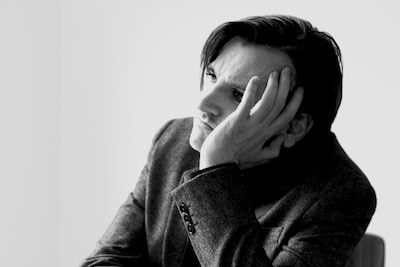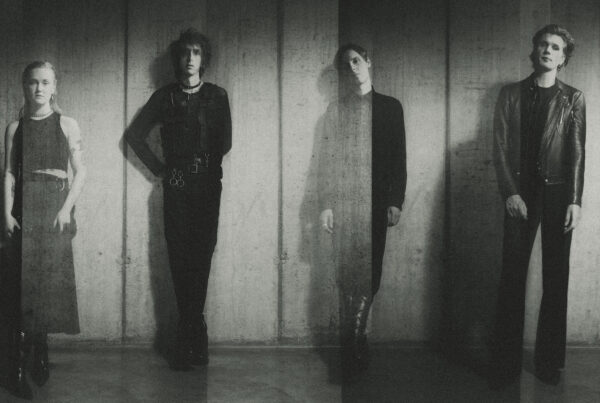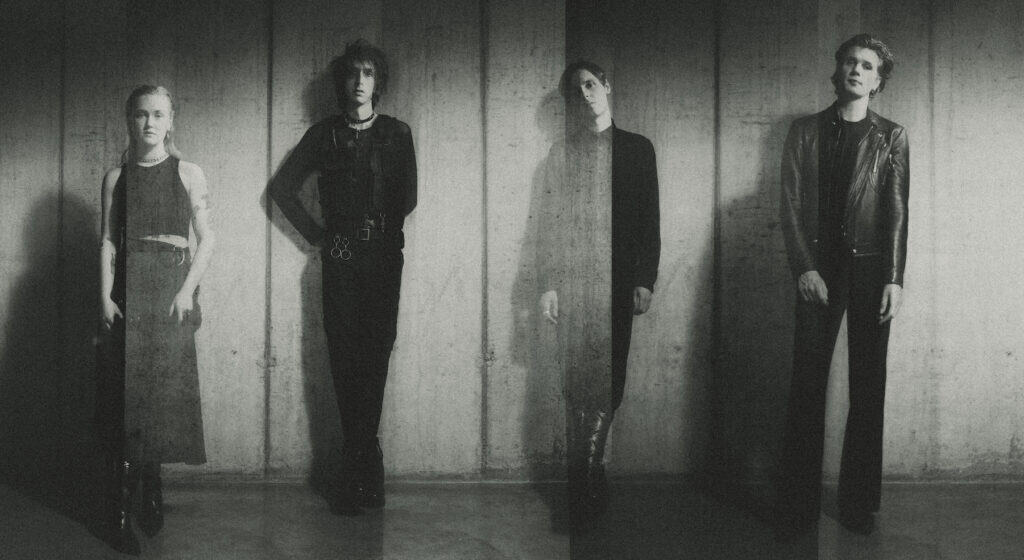It’s easy nowadays, to forget just how popular Menswe@r became during Britpop’s early years; the band performed regularly on Top Of The Pops and were seen as the UK’s next great export along with Oasis, Blur and Pulp. Now in 2013, Officers’ Jamie Baker talks to ex-Menswe@r frontman Johnny Dean in an exclusive and candid interview about the demise and the fallout from being at the centre of the whirlwind that was Britpop, being “missing” for 15 years and the gigs he’s putting together for autism awareness.
“I don’t own any Menswe@r records!”
S] Firstly hello Johnny, and how the bloody hell are you?
J] “Right now I’m wondering why I’m not doing a tribute to the Sex Pistols, or the Ramones, or the Clash. It would have been a lot easier than Bowie…”
S] It’s been years since we’ve heard anything from you at all (even to the point of having a website dedicated to finding where you were) can you talk to us about where you’ve been and what you’ve been up to and why the disappearance.
J] “I’ve been on a journey that saw me facing up to self-loathing, self-doubt, self-blame, self-pity, anger, with myself, resentment, and regret. And I kicked every last one of those things to the curb. Except certain regrets. People who claim to have no regrets have either lived a very dull life, or have difficulty accepting they could ever have made mistakes. Regrets are what make us most human. It’s about having a conscience. Accepting responsibility. I came to the realisation that choosing who you surround yourself with is half the trick to gaining a happy life. The other half is having courage. Real courage is about accepting the truth and learning from your indiscretions. Understanding that saying ‘sorry’ makes you strong. There was nothing spiritual about this journey, that Deepak Chopra guff just ‘ain’t my style. That’s all about “avoiding” the truth, dodging responsibility, spouting holier than thou bull**it because you’re afraid of what might happen if you actually considered the repercussions of your actions. A lot of it seems to hinge on deferring responsibility to some great power in order to exonerate oneself of any blame when it come to committing wrongs. That’s a massive monolith of mammoth sh**. Cowardly. Easy. I can see why people buy into it. But self-awareness is important. You don’t get self aware by reading self-help books or re-tweeting the Dalai Llama. You get self-aware from getting “real”. You have to be honest with yourself and accept your faults and limitations, and then see if you can better them, or learn to live with them. Yeah, it’s been quite a trip. Basically I am the Britpop Ulysses…”
S] You’re performing the work of Bowie at a London show in June, how are you feeling in advance of the show? It’s been awhile ‘off the stage’ – is there anything else we can expect? Could we perhaps see a tour?
J] “I guess I’m nervous. I don’t have the best singing voice, and Bowie’s is immaculate. Bowie is my biggest hero. And I don’t have that many heroes. But he’s number one head-honcho in my book. I revere him for his effortless talent, his apparent dignity, his vision, his class. So doing a set of Bowie songs is fairly daunting. I’m hoping people aren’t expecting to see some kind of carbon copy replica of an actual Bowie show, because that’s not going to happen. Fun. That’s the point of all this. So if you fancy a bit of noisy Bowie revelry and maybe want to get involved, come along. If you’re going to stand there arms crossed and compare it all to the 1973 Hammersmith Apollo show you’re probably best off waiting to see if the man himself will do a tour at some point. There might be some more surprises on the night musically, it depends how I feel, and if I think the audience deserves it. Ha! As for touring, it’s a drag to be honest. I thought it was a drag when I was 23, so I doubt I’m gonna fall in love with it at 41…”
S] The show is in aid of the National Autistic Society – can you tell us a bit about your reasons for working with that charity and some of the work that they do. How else can people get involved?
“Autism is still fairly misunderstood in the UK. There are so many myths that people have accepted as fact and it’s important, to me, that people are educated about the condition. The National Autistic Society work hard to inform people about autism as well as giving those affected by it much needed support. Roughly one in every hundred people have some form of autism, so it’s not as rare as some might think. It’s my pleasure to help the NAS in any way I can. Anyone can contact the NAS if they want to do a fund raising event, it’s not difficult, how hard is it to write an e-mail or make a phone call? But just educating yourself about the condition is enough in my book. An hour or so of your time reading about it on Wikipedia, or the NAS website. Ignorance is not an excuse…”
S] You’ve talked a little bit recently about having Aspergers, and a few other luminaries, such as Gary Numan, have now started to speak out about living with the condition. Can you explain when you first got diagnosed, how you deal with it and is there any advice you can give to others..
J] “Ha! A little bit?! It’s all I talk about these days! And rightly so! I think it’s essential for people with Aspergers to talk about it. Even more so if they are people in prominent positions. It helps to dispel any illusions people might have about us guys being helpless or unable to function or needing full-time care in order to survive. If encouraged properly, given the right guidance, tolerance and a lot of love, a person with Aspergers can excel. Fact. Since I could remember I had always felt different. I was very conscious that the way I thought was different to my peers. The way I interpreted the world. Information. Language. People. A lot of things confused me that seemed to leave other kids unaffected. At the same time I felt I understood certain things better, picked them up quicker. I would feel I had more in common with adults. When I was growing up, in the 70s and 80s, people were quite aware of full-blown autism but conditions on the other-end of the autistic scale were unheard of, especially in the UK. I had always felt an affinity with autistic people, some of the traits seemed to ring bells, but I ignored it. I can’t be autistic! I’m nothing like Rainman, etcetera, etcetera. Naturally the result of being undiagnosed led to depression, alienation, wanting to escape, drug abuse, meltdowns. I struggled. For years. Life was just a long painful slog. Everything just felt wrong and even worse, I felt, and was often made to feel like I was some kind of idiot loon. It was hellish basically. No one should have to struggle like that. I’m convinced to this day that certain people who I worked with back in the Menswe@r days have very little, or indeed no appreciation of what it was like for me back then. Even now. It was intense, just trying to keep things together was such a strain, a monumental task. Seriously, they have no idea. And when I hit walls there was very little support. They had their own self-generated ‘problems’ to worry about I guess, or maybe they didn’t care? They’ve certainly had ample opportunity to express any regrets. Understand I’m not bitter about it, just disappointed. Sad. Massive difference. Like I said, half the trick to having a happy life is surrounding yourself with the right people.
Eventually, approaching my mid-thirties I heard about Aspergers. It was like someone had turned the lights on. Bang! That’s it! Home! A few years later, after one of the worst bouts of depression that left me catatonic, I bit the bullet and sought a diagnosis. Enough was enough. I was tired of hiding from it to be honest, or in fact hiding it. Some people are dragged kicking and screaming into hospitals to be diagnosed with autism. It’s a shame. A symptom of a society that is intolerant, bigoted, and places stigma on mental illnesses or neurological conditions like Aspergers. I, however, felt nothing but relief. It was like getting off at the right station even though you were asleep for much of the journey. Home. And I embrace it. As should anyone diagnosed. It’s who I am. Most people go through most of their lives without knowing who or what they are. I’m lucky. So my advice to others, my fellow travellers in autism is this. Embrace it. Enjoy it. Live like you want to, and never let anyone treat you as an inferior, don’t let anyone talk to you like you are less of a person. You are a wonderful human being. You are extraordinarily precious. You are going to do great things. If you are a child or teenager, don’t worry, it gets better. If you are an adult, diagnosed late, then hold your head up high, you have come so far and against unbelievable odds you are still here. I know that path you’ve walked and I have nothing but utter admiration for you. Love.”
S] How do you feel about the legacy Menswe@r left behind and everything else that followed with Britpop at this point in your life? There seems to be a lot of misconceptions about the band, and people seem to forget you were ostensibly kids writing tunes for a laugh. The premise seemed pretty much at odds with the machinery inevitably behind the band and the britpop movement. To then go fu** the record company off, experiment and make a country album must have taken some balls. How did you get away with it?! Anything you regret looking back?
J] “After Menswe@r split I tried my very best to avoid anything to do with it. I actually don’t own any Menswe@r records! We were given such a hard time, by the music press especially. Well, it was usually certain journalists. I understand that there’s a demand for music criticism, and criticism is fine, but a lot of what we received wasn’t even criticism. It was just people being nasty at the end of the day. Mean. Bullying. It’s endemic in British culture isn’t it, bullying? And the press are the biggest bullies out there. Which in turn makes it okay for people to come up to me in the street and be abusive. Sometimes physically. Some people might find that great fun. I don’t. I think it fu**ing stinks. People need to be more responsible. Picking on some kids for making music, having fun and getting a record deal is fu**ing dumb. Sure, if you don’t like the music, that’s fair enough, just don’t listen to it. Easy. But getting personal? I think that kind of thing says a lot about the person writing that kind of sh**. So having been put through the mill for daring to make some pop records I was a little bit reticent to get back in the saddle after we split. Over the years I’ve had conversations with people who loved what we did and inevitably the same question always pops up. Reunion? I don’t think so. But maybe something else…one day. I am however very proud of what we achieved. We took the music industry on, we had hit records, some of which I personally think are great pop singles. We made a mark in what may prove to be the last important cultural movement produced by Britain. We were as much a part of Britpop as our more successful peers were, our input can’t be ignored. I embrace it now. It’s part of me.
A lot of people still hold the misconception that Menswe@r were a manufactured band. This is because certain publications still push the idea. It’s not true. I’ve met people who were in nappies during the Britpop period who think they know better than me because they read an NME special or saw a blog by someone called BritModChamp. We manufactured ourselves. If you have a problem with that then you really should have a problem with just about every other band out there. Okay, so we looked good. And? If we’re going to go into the whole ‘manufactured image’ thing then it’s worth pointing out that two of the most iconic bands in British music history were far more contrived than Menswe@r. That’s right, I give you The Beatles and the Sex Pistols. Nobody told me what to wear. I pity anyone who’d try. The Pistols were put together to sell clothes! So let’s not have that discussion. It’s just silly. I think it’s lazy really. Just cribbing what someone else has written. Which brings me to the music. So apparently we were ripping off Elastica? Really? This argument usually arises because the person blurting it has heard one of our songs, ‘Daydreamer’. Point of fact. ‘Daydreamer’ is ripping off Wire. Not Elastica. And we were not sued by Wire like Elastica were, because ‘Daydreamer’ is influenced by Wire, rather than plagiarising them. I was actually introduced to Wire by Graham Coxon, not Elastica. Additionally, none of our other songs sound like ‘Daydreamer’. Again, it’s just lazy…and boring.
The second album is quite a befuddling thing really. A strange beast. Very much a cocaine and heroin record. I have difficulty listening to it. I don’t even regard it as a Menswe@r record to be totally honest. We didn’t set out to piss London Records off by making a country rock record. I was fairly unconvinced by the whole thing, but by that point I had passed the point of caring. It was a compromise, that album. Internally Menswe@r suffered from a lot of disruption. There were always factions within the band and it’s entourage. Sometimes it appeared the entourage had far more influence over what happened than the actual band members. It was very unhealthy. ‘Schizophrenic’ would sum it up perfectly. Looking back I can see that certain people were not team players, they wanted things their way or else. That’s how ‘Hay Tiempo’ happened. Absolutely. A compromise to keep people happy. It basically prevented the band from splitting in mid ‘96. That’s the actual truth of it. Matt Everitt’s sacking was the start of a shift in power, most definitely. He had always been the voice of reason, an anchor that kept the ship from drifting off into arbitrary territory. When the chain to that anchor was cut we were pretty much sunk. Ultimately we paid the price, London Records didn’t want anything to do with that album and I can’t blame them, so our contract was mutually terminated. Understandably, nobody else wanted to invest in Menswe@r, surprise! And that was that. So we didn’t ‘get away with it’ at all.”
If you could have held things down without the industry and media pressures do you think you’d have taken the same experimental approach? Would we maybe have seen a kraftwerk-esque menswe@r record further down the line?
J] “This amuses me because I don’t view ‘Hay Tiempo’ as an experimental affair at all. The ‘mental’ part maybe. I think it’s fairly plodding, ‘pedestrian’ rock. Ostentatious. Self-indulgent to the point of being masturbatory. The kind of thing your (grand) dad listened to in the late 70s. I, personally, had always envisaged going down the Eno ‘Warm Jets’, Roxy Music, mid-to-late 70s Bowie route. Because that’s what I identified with. I’m British. And because it seemed more of a natural progression from ‘Nuisance’. And yes, a bit of Kraftwerk. You can hear this on ‘Crash’, a demo that appeared on one of the ‘We Love You’ releases. But like I said, pushing for that would have seen the band split mid ‘96. Definitely. Thinking about it now, I think that maybe we should have split. It would have made more sense. Less stressful.”
S] Apart from the Internet advances in selling and communication, what do think are the main differences for bands starting out these days. Is the ‘industry’ that much different at its heart do you think or do you think it has the same challenges.
J] “The industry is so different now. The physical market is pretty much dead. Over. The big wigs have had to do a lot of adjusting in the last few years, and I bet they’re still running scared because it’s only going to change even more in the next decade. The world wide web has completely changed the game. And I expect it to make more of an impact in the next decade, I’ve actually studied this stuff. There’s so much potential for bands to bypass the recording industry and the various businesses that feed off it. My advice to bands that are starting to make waves is this: do not blindly swim into the nets cast by record and management companies. Consider things very carefully before you sign anything. Remember the industry will be very different in just a few years time. The power is shifting. There are people out there who are perpetuating certain myths because if they didn’t they’d be out of a job. You don’t need them. You’ll need an internet connection, a bit of savvy, and a PA at the most. An administrator. They’re a lot cheaper and won’t make you feel like you’ve sold your soul to the devil.”
S] It’s been almost 20 years since the “Britpop” tag was coined. And we use the term loosely. Do you ever think we’ll see a movement in music, art, society, politics cross over like we did in the 90s come around again soon?
“No. Hand on heart. No. It’s a different world now. The web has changed everything. The Global Village has changed everything. They were innocent times. The last time we were so innocent I think. So, no…”
What types of cultural things are inspiring you right now? Music art or other. Are you working on or thinking of working on any new musical or creative projects (Brit pop gladiators aside). Are we about to witness a bit of a thaw session? Or is it strictly a one-off revisitation.
J] “I like it all. It’s all good. I’m not as bothered by contemporary music as I used to be. Strangely I think that’s made me happier, not giving a fu** about the Band of the Week. I go to more art exhibitions now than I do gigs. I used to be an art student. An “arty fu**er” as Matt Everitt would put it. I’d love to see people use the web more with art and music. It’s so accessible, no matter where you are. Smartphones. Tablets. There’s so much potential. So much. Excited. Who knows what could happen? Who fu**ing knows?”
For more information visit the official Menswe@r website.
Follow Johnny Dean on Twitter, find out more about the National Autistic Society, and buy tickets to his must-see show here.
Images: Hannah Goodwin









